President Joe Biden met with Pope Francis in late October, the first time in more than half a century that a Catholic American leader met with the head of the Catholic Church at the Vatican. The meeting took place under heavy criticism from conservative bishops in the United States who want to deny Biden communion over his stance on abortion. Biden noted after the meeting that the Pope said he should continue to receive communion, and the Vatican released a statement indicating that the two men discussed “the joint commitment to the protection and care of the planet, the health care situation and the fight against the Covid-19 pandemic, as well as the theme of refugees and assistance to migrants.”
Newly released data from PRRI’s 2021 American Values Survey shows that about one in five Americans (22%) identify as Catholic, including 13% who identify as white Catholic and eight percent who identify as Hispanic Catholic, as well as a small proportion of other Catholics of color, percentages that have remained generally stable since 2010.
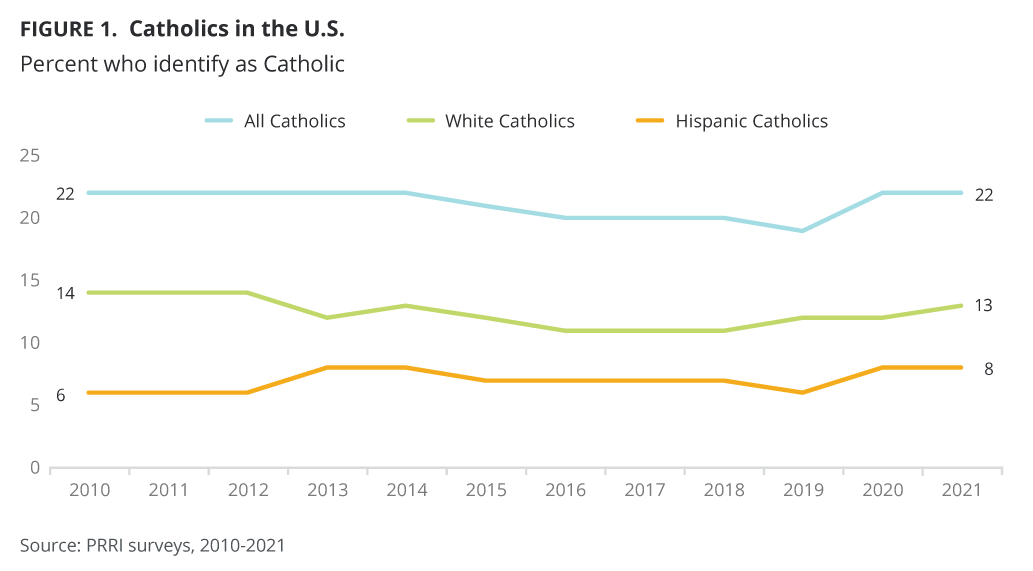
White Catholics and Hispanic Catholics identify different issues as critical, but abortion is not a critical issue among a majority of either group (26% and 38%, respectively). The top three issues white Catholics identify as critical are immigration (57%), terrorism (55%), and health care (52%), and the top three issues for Hispanic Catholics are the coronavirus pandemic (69%), terrorism (66%), and crime (62%).[1] Hispanic Catholics are significantly more likely than white Catholics to say the pandemic (69% vs. 51%), crime (62% vs. 47%), climate change (61% vs. 37%), increasing costs of housing and everyday expenses (60% vs. 37%), racial inequality (57% vs. 26%), and ending the war in Afghanistan (42% vs. 22%) are critical issues.
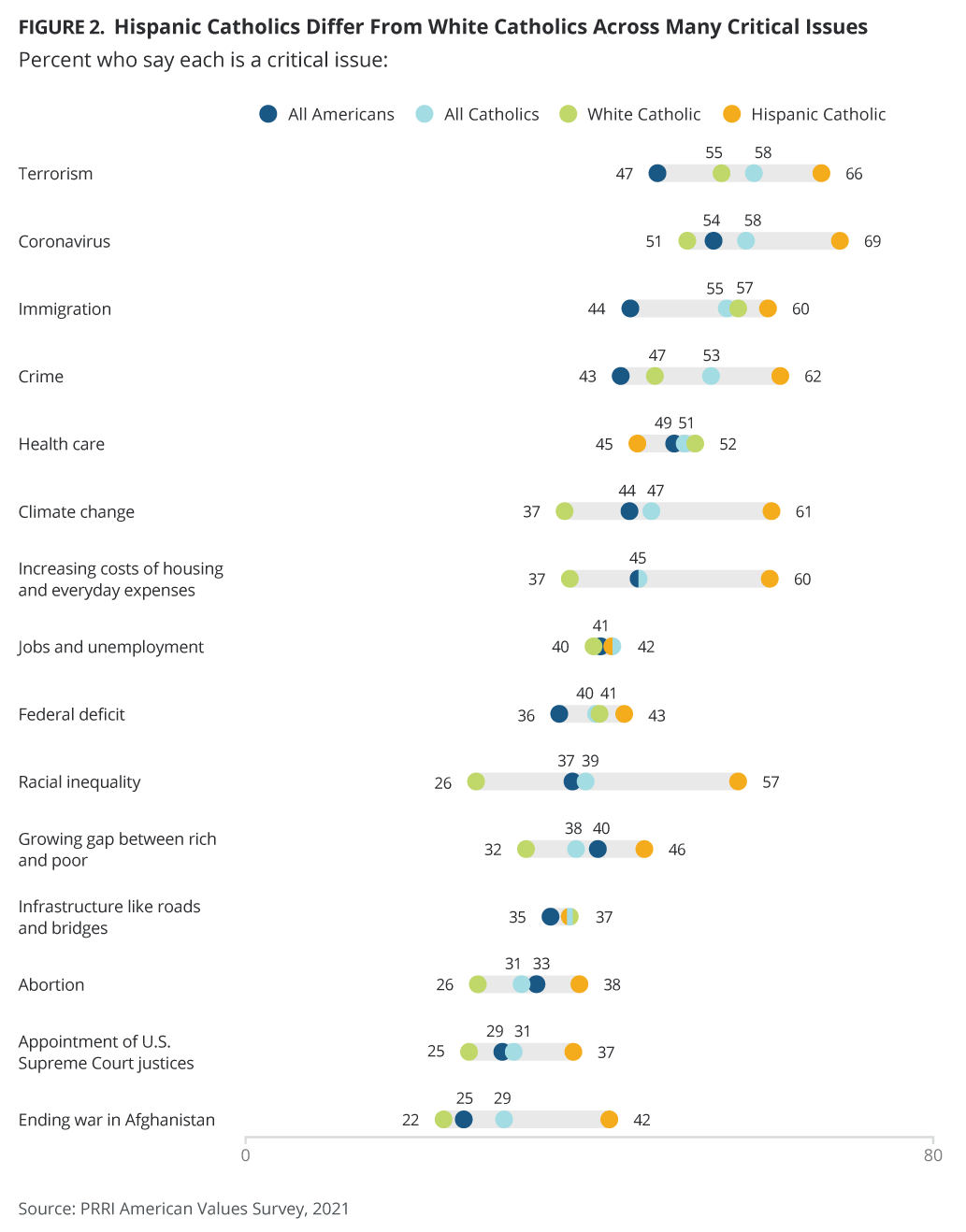
Views of Joe Biden as President
With the exception of immigration and the economy, majorities of Catholics approved of the job Joe Biden is doing as president as of late September, but the gap between white Catholics and Hispanic Catholics is substantial. Hispanic Catholics are considerably more likely than white Catholics to approve of the job President Biden is doing, including handling the COVID-19 pandemic (73% vs. 48%), the job Biden is doing as president (72% vs. 38%), his decision to withdraw American troops from Afghanistan (66% vs. 42%), handling the economy (66% vs. 38%), and handling immigration (52% vs. 28%).
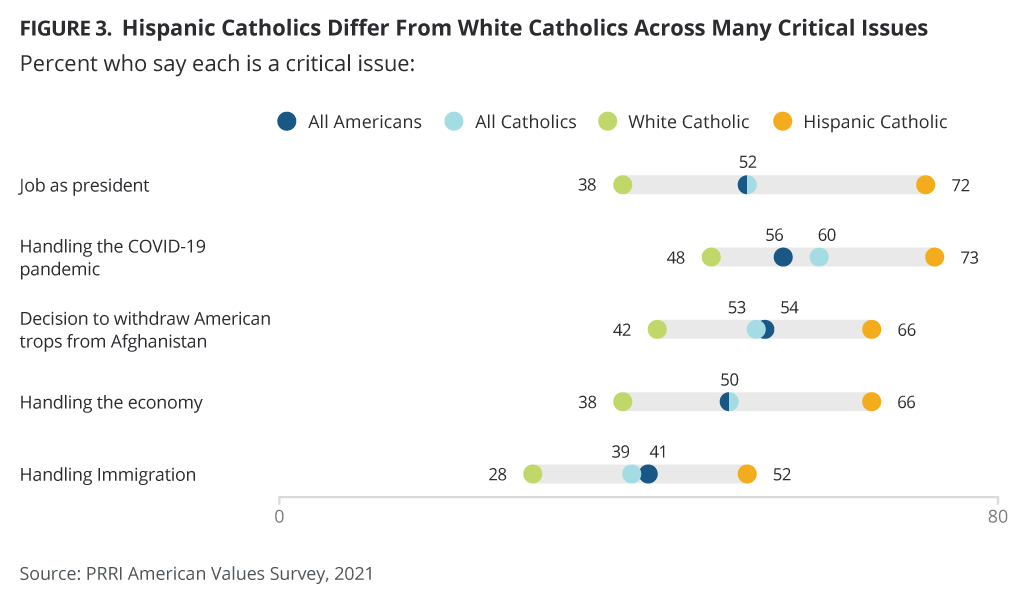
Abortion
There are no significant differences between white and Hispanic Catholics regarding their views on abortion. When asked about the legality of abortion, the majority of Catholics say abortion should be legal in all or in most cases (55%), including 56% of white Catholics and 54% of Hispanic Catholics. When asked how much they agree or disagree with the statement “Roe v. Wade, the 1973 Supreme Court decision that affirmed a constitutional right to abortion, was the right decision and should be upheld,” again majorities of Catholics (59%), both white Catholics (61%) and Hispanic Catholics (56%), agree with upholding the Roe v. Wade decision.
Even though majorities of Catholics (67%) disagree with the statement “In my lifetime, I believe it is likely that no one will be able to get a legal abortion in the U.S.,” white Catholics are notably more likely to do so than Hispanic Catholics (74% vs. 56%).
Terrorism
Majorities of all Catholics say terrorism is a critical issue. When asked if Americans today are safer or less safe from terrorism after ending the war in Afghanistan and withdrawing troops stationed there, the majority of white Catholics (57%) say the withdrawal made the country less safe, compared to 49% of all Catholics and 40% of Hispanic Catholics. In fact, Hispanic Catholics (27%) are more likely than all Catholics (18%) and white Catholics (11%) to say the withdrawal made the country safer. By contrast, when asked if the U.S. engaging in wars in Iraq and Afghanistan following the 9/11 terrorist attacks made the country safer or less safe from terrorism, nearly half of white Catholics (47%) say it made the country safer, compared to 39% of all Catholics and 27% of Hispanic Catholics. About three in ten Hispanic Catholics (35%), all Catholics (31%), and white Catholics (27%) say that the U.S. engaging in wars in Iraq and Afghanistan made the country less safe from terrorism.
Pandemic
Even though the coronavirus pandemic is one of the top critical issues for Hispanic Catholics, when asked specific questions related to COVID-19 vaccines, there are no significant differences between them and white Catholics. For example, majorities of both Hispanic Catholics (64%) and white Catholics (61%) oppose allowing children to attend public schools without receiving required vaccines if getting those vaccines violates their parents’ or their own religious beliefs. In addition, both Hispanic Catholics (44% favor, 54% oppose) and white Catholics (48% agree, 51% oppose) are divided over allowing individuals who would otherwise be required to receive a COVID-19 vaccine to refuse if doing so violates their religious beliefs. There is a significant gap between Hispanic Catholics and white Catholics in their support for requiring proof of COVID-19 vaccination to participate in certain activities, such as travel, work, or school. Hispanic Catholics are notably more likely than white Catholics to favor this requirement (75% vs. 58%). It is worth noting that 78% of both Hispanic Catholics and white Catholics reported receiving at least one dose of a COVID-19 vaccine in late September.
Immigration
White Catholics’ views on immigration policy, one of their top critical issues, tend to be more restrictive than those of Hispanic Catholics. A majority of Catholics (60%), including 70% of Hispanic Catholics and 54% of white Catholics, agree that immigrants who are currently living in the U.S. illegally should be allowed a way to become citizens provided they meet certain requirements. They also feel this way about immigrants’ children, better known as Dreamers. Three in four Hispanic Catholics (76%) and 56% of white Catholics favor allowing immigrants brought illegally to the U.S. as children to gain legal resident status.
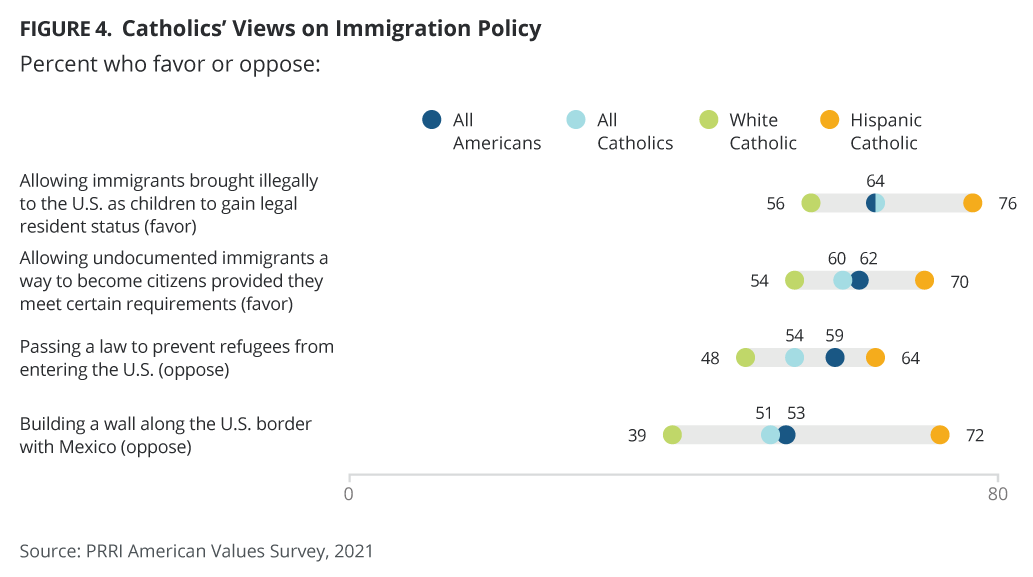
However, when asked about restrictive immigration policies, the vast majority of Hispanic Catholics oppose building a wall along the U.S. border with Mexico (72%) and oppose passing a law to prevent refugees from entering the U.S. (64%), compared with less than half of white Catholics who think similarly (39% and 48%, respectively). When asked if more restrictive immigration policies have made Americans today safer or less safe from terrorism, less than half of both white Catholics (45%) and Hispanic Catholics (39%) say that restrictive immigration policies have made it safer, compared to about two in ten white Catholics (17%) and Hispanic Catholics (22%) who say it made the country less safe.
Economic Issues
About six in ten white Catholics (63%) and Hispanic Catholics (60%) say that the economic issues the country faces are primarily a result of long-term problems, compared to 35% and 39%, respectively, who say the economic issues the country faces are primarily a result of hardships caused by the coronavirus pandemic. When thinking about government programs, Hispanic Catholics (68%) are significantly more likely than white Catholics (43%) to say that it is more important to invest in government programs to help American families and rebuild infrastructure than to reduce government spending to lower the national debt (32% vs. 56%).
Catholics are particularly concerned with their ability to pay for basic goods (44%), as well as rent or mortgage (32%), credit card debt (30%), and student loans (25%). However, Hispanic Catholics are significantly more likely than white Catholics to express concerns about paying for basic goods (51% vs. 38%), credit card debt (39% vs. 23%), rent or mortgage (38% vs. 25%), and student loans (34% vs. 19%).
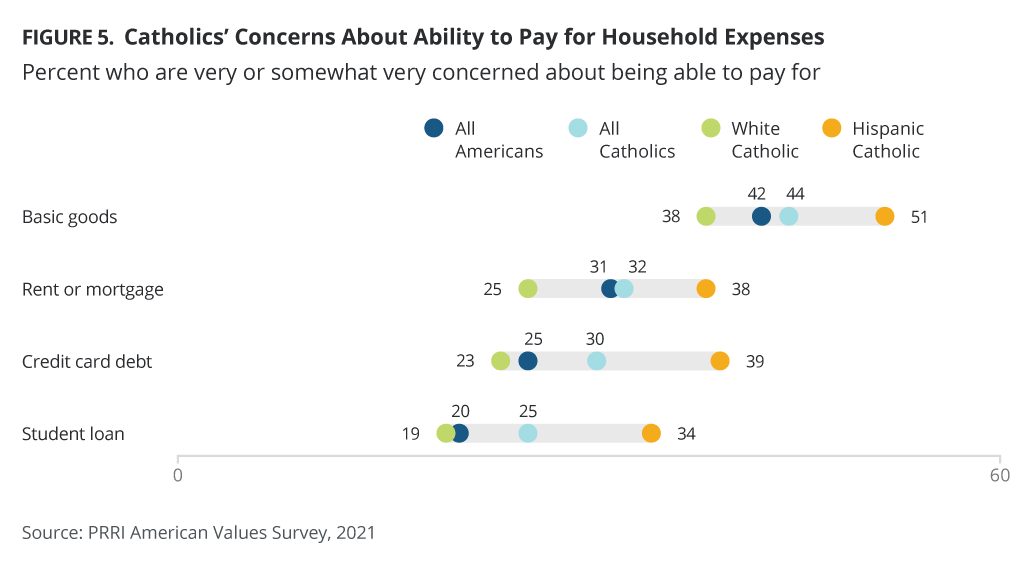
[1]Some questions regarding critical issues in the 2021 American Values Survey were only asked of half the sample. Because of this, the sample size for Hispanic Catholics for some of these questions is 72. The differences reported here are for those significant at the 0.05 level. However, differences are significant at the .10 level: Hispanic Catholics are more likely than white Catholics to say that the growing gap between rich and poor (46% vs. 32%) and the appointment of U.S. Supreme Court justices are critical issues.